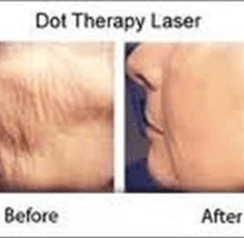LASER SURGERY
Laser SurgeryPlastic, Reconstructive and Aesthetic Laser Surgery

The CO2 laser
is a small beam of light that allows the vaporization of unwanted superficial cellular layers, avoiding damage to healthy tissue and providing a scar-free and bloodless repair. Within the 3-4 mm that the light beam penetrates, it triggers a process of collagen fibre stimulation, which had been dwindling, by reactivating new fibroblasts—cells responsible for producing new collagen, hyaluronic acid, and elastin—restoring tone and elasticity to the skin of the face, neck, décolleté, back of the hands, or other areas of the body. The treatment should be repeated after 7 days to consolidate the result and maintain it for several months.
Indications
The fractionated CO2 laser is indicated and provides excellent results for:
- Reduction of wrinkles
- Significant reduction and sometimes elimination of post-acne scarring
- Lifting effect (to improve tissue tone)
- Various types of spots
- Melasma
Surface Surgery LASER
- Scar and keloid correction
- Removal of fibromas, xanthelasmas, tattoos, warts, sebaceous cysts
- Treatment of rosacea, acne, skin spots…
- Anal conditions: polyps, haemorrhoids, fissures, condylomas, perianal fistulas, sacrococcygeal cysts
- Penile conditions: phimosis, short frenula, condylomas…
- Nail conditions: ingrown nails, chronic fungal infections, onychogryphosis…
- Benign skin neoplasms: fibromas, epithelomas, acanthomas, basal cell carcinomas, sebaceous cysts, lipomas, warts
- Flat angiomas, star angiomas, telangiectasia, couperose
- Dermabrasion for acne, scar, or keloid marks, using a combined technique of vaporization and salification
- Tattoo removal…
Advantages
The advantages for the patient with this technique include the complete absence of bleeding, short procedure times, rapid healing, and aesthetic results that cannot be achieved with other surgical techniques. It is particularly suitable for children and anxious individuals.
Contraindications for treatment with the fractionated CO2 laser include:
- Patients with herpes virus
- Pregnancy or breastfeeding
- Patients on corticosteroid therapy
- Dermatitis
- Autoimmune diseases
- Collagen diseases
The specialists
Dr. Crucitti Salvatore
CORTE DELLA SALUTE MULTI-SPECIALTY MEDICAL CENTRE
61, Via Magenta - 20021 Bollate (MI) - Italy | VAT No. 06704480968 | Tel. +39 02 3501312 | Fax. +39 02 92869916 |




